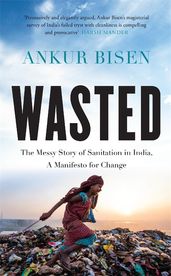Synopsis
PRAISE FOR WASTED
‘This book enhances our understanding of the historical issues that
have plagued India’s sanitation challenge. A must read for those who are
interested in the important agenda of a clean environment for all’
NAINA LAL KIDWAI, Chair, India-Sanitation Coalition
‘Despite the clarion call by our Prime Minister, Indian society still lacks
clarity on the nature of the desirable solution for sanitation. Wasted is a serious attempt at pointing out possibilities and solutions. Written lucidly and in
a narrative style; it provides an inspiring peek of a clean future. A much-needed book for our times’ DR RAJIV KUMAR, Vice Chairman, Niti Aayog
‘Wasted advocates that the handling of waste in India requires the finest
management and developmental architecture. The book remarkably delves into the depth and breadth of the problem of yesterday and today and presents it as a free-flowing storytelling’
MARTIN MACWAN, Dalit human rights activist
‘Wasted locates India’s missed opportunities in sanitation in its complex
civilizational legacy; its comfort with caste, informality and child labour;
and in its appalling local governance systems. Necessary reading for every
policy maker, town planner and engaged urban citizen.’
HARSH MANDER, author and activist
‘Wasted addresses India’s complex caste-driven perception of waste. It traces
the illogic of our constant discontent with modes of disposal, while being
deliberately blind to socio-political processes behind its creation. This book
must be read by all concerned Indians’ ARUNA ROY, socio-political activist
and Magsaysay Award winner (2000)
‘India is not working on the science needed towards the management of pollution that it emits in the name of development. Therefore, even well-intentioned projects do not yield results. This book can be an entry point to understanding the process
to reduce use of nature and to rejuvenate nature for our sustainable future’
DR RAJENDRA SINGH, environmentalist and Magsaysay Award winner (2001)
ABOUT THE BOOK
Urban India generates close to 3 million trucks of untreated garbage every day. If these were laid end-to-end, one could reach half way to the moon.
The need for attention to sanitation and cleanliness is both urgent and long-term.
This book takes an honest look into India’s perpetual struggle with these issues and suggests measures to overcome them. Historically, we have developed into a society with a skewed mindset towards sanitation with our caste system and non-accountability towards sanitation.
Through stories, anecdotes and analysis of events, this book seeks solutions to the current entangled problems of urban planning, governance and legislation, and institutional and human capacity building. Wasted traces interesting relationships between urban planning and dirty cities in India; legislative and governance lacunae and the rising height of open landfills; the informality of waste management methods, and the degrading health of Indian rivers, soil and air.
Arguing that all current solutions of India are extrapolated from these flawed beliefs and structures and are therefore woefully inadequate, Bisen draws a benchmark from clean countries
of today.
Underlining the need for inclusive human clusters, specificity in legislation, correction of existing social contracts and governance frameworks, creating a formal resource recovery industry in India, and the pursuit of diplomacy around this industry, this book shows how these solutions could lead us towards a brighter future and better social development.
